Watched June 4 - 10, 2007: Gosho, Imai, Uchida, To, Yamada, Nishitani
Ima hitotabi no / Once Again (Heinosuke Gosho, 1947)
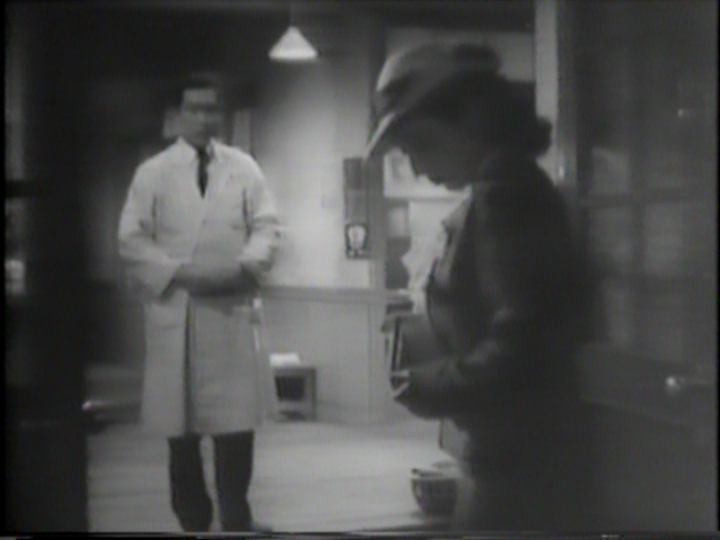 A high-minded, romance between a young doctor and a wealthy young woman (an actress playing Ophelia when seen first), set against the backdrop of the rise of totalitarianism, the war, and the immediate aftermath of the war. The script strikes me as a bit arbitrary -- and we never quite figure out why the poor little rich girl (Mieko Takamine) falls in love with the virtuous plebeian (and a bit stolid) doctor (Ichiro Ryuzaki). Still even a subpar video transfer of this film doesn't entirely mask the fact that this is a very good-looking, well-presented film.
A high-minded, romance between a young doctor and a wealthy young woman (an actress playing Ophelia when seen first), set against the backdrop of the rise of totalitarianism, the war, and the immediate aftermath of the war. The script strikes me as a bit arbitrary -- and we never quite figure out why the poor little rich girl (Mieko Takamine) falls in love with the virtuous plebeian (and a bit stolid) doctor (Ichiro Ryuzaki). Still even a subpar video transfer of this film doesn't entirely mask the fact that this is a very good-looking, well-presented film.
http://i9.photobucket.com/albums/a59/mkerpan/once_again/ima05.png
http://i9.photobucket.com/albums/a59/mkerpan/once_again/ima02.png
http://i9.photobucket.com/albums/a59/mkerpan/once_again/ima06.png
Himeyuri no tô / Tower of Lilies (Tadashi Imai, 1953)
 The Himeyuri Gakuto (Star Lily Corps) was a group of around 200 high school girls (ranging from 15 to 19 years old) who were called into service as nurse's aides just three days before the Allies began the invasion of Okinawa (a battle which would last around three months). As the Japanese military position worsened, the hospital corps was dissolved, and the girls and their teachers were left to try to find their own way home. Only 80 or so of the girls survived, most died due to privation (it rained constantly for a month or so as they tried to cross the island on foot), Allied attacks and suicide (terrified of what would happen if they fell into the hands of the invaders).
The Himeyuri Gakuto (Star Lily Corps) was a group of around 200 high school girls (ranging from 15 to 19 years old) who were called into service as nurse's aides just three days before the Allies began the invasion of Okinawa (a battle which would last around three months). As the Japanese military position worsened, the hospital corps was dissolved, and the girls and their teachers were left to try to find their own way home. Only 80 or so of the girls survived, most died due to privation (it rained constantly for a month or so as they tried to cross the island on foot), Allied attacks and suicide (terrified of what would happen if they fell into the hands of the invaders).
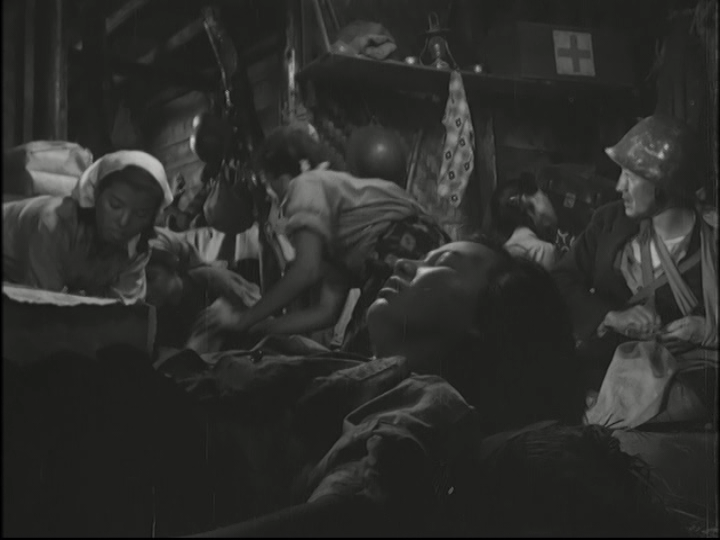 The film, though fictionalized to some extent, seems to follow the historical facts reasonably closely (American authorities forbade filming this on Okinawa -- so this was actually shot in southern Japan). Insofar as there is a central character, it is the young student played by Kyoko Kagawa. Teachers included Susumu Fujita, Eiji Okada and Keiko Tsushima. All the huge cast of girls does well, however.
The film, though fictionalized to some extent, seems to follow the historical facts reasonably closely (American authorities forbade filming this on Okinawa -- so this was actually shot in southern Japan). Insofar as there is a central character, it is the young student played by Kyoko Kagawa. Teachers included Susumu Fujita, Eiji Okada and Keiko Tsushima. All the huge cast of girls does well, however.
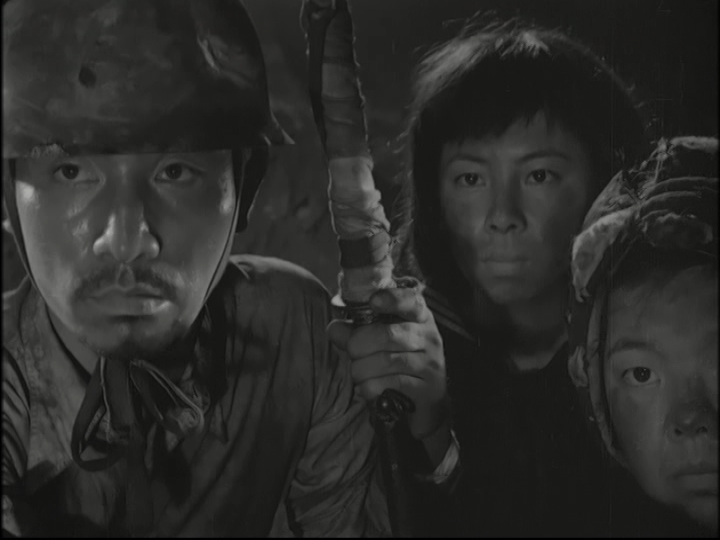 One guesses that, when the weather clears, allowing the girls a brief moment of pleasure, disaster looms -- and it does. A lot of similarities here to Ichikawa's war films -- and Takahata's "Grave of the Fireflies". As usual for Imai, well-directed and expertly shot (by his regular cinematographer Shunichiro Nakao).
One guesses that, when the weather clears, allowing the girls a brief moment of pleasure, disaster looms -- and it does. A lot of similarities here to Ichikawa's war films -- and Takahata's "Grave of the Fireflies". As usual for Imai, well-directed and expertly shot (by his regular cinematographer Shunichiro Nakao).
http://i9.photobucket.com/albums/a59/mkerpan/himeyuri/himeyuri03.png
http://i9.photobucket.com/albums/a59/mkerpan/himeyuri/himeyuri04.png
http://i9.photobucket.com/albums/a59/mkerpan/himeyuri/himeyuri05.png
http://i9.photobucket.com/albums/a59/mkerpan/himeyuri/himeyuri06.png
http://i9.photobucket.com/albums/a59/mkerpan/himeyuri/himeyuri12.png
http://i9.photobucket.com/albums/a59/mkerpan/himeyuri/himeyuri15.png
http://i9.photobucket.com/albums/a59/mkerpan/himeyuri/himeyuri18.png
Kiga kaikyo / Strait of Hunger / Fugitive from the Past (Tomu Uchida, 1965)
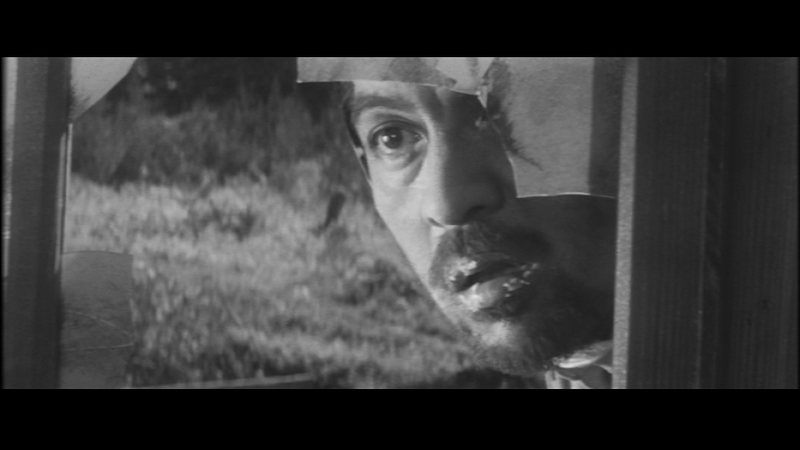 Rentaro Mikumi stars here as Inukai, one of a trio who pulls off a robbery during the height of a deadly typhoon (a real one, that took place in 1947). As the storm subsides, he makes his getaway across the strait that separates Honshu and Hokkaido -- leaving us to wonder what happened to his accomplices.
Rentaro Mikumi stars here as Inukai, one of a trio who pulls off a robbery during the height of a deadly typhoon (a real one, that took place in 1947). As the storm subsides, he makes his getaway across the strait that separates Honshu and Hokkaido -- leaving us to wonder what happened to his accomplices.  Inukai is rescued, in a manner of speaking, by Yae a good-natured, but somewhat scatty young woman (Sachiko Hidari), whose father runs a small hot springs resort. As a parting gift, Inukai leaves far too large a tip, making Yae positively worshipful. With her windfall, Yae plans to go to Tokyo to seek her fortune.
Inukai is rescued, in a manner of speaking, by Yae a good-natured, but somewhat scatty young woman (Sachiko Hidari), whose father runs a small hot springs resort. As a parting gift, Inukai leaves far too large a tip, making Yae positively worshipful. With her windfall, Yae plans to go to Tokyo to seek her fortune. 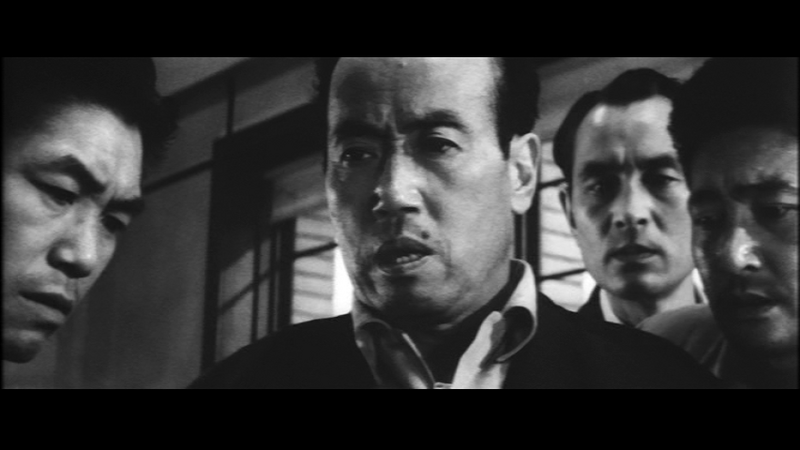 As she is planning her departure, a police lieutenant (Junzaburo Ban) visits the spa, seeking Inukai -- who is apparently wanted in connection with the death of two men. Yae does move -- but finds Tokyo not so nice as she imagined, finding a job only as a waitress in a seedy restaurant in a very crime-ridden part of the city. Her luck turns when she convinces a kindly couple who runs a small brothel to hire her as an apprentice.
As she is planning her departure, a police lieutenant (Junzaburo Ban) visits the spa, seeking Inukai -- who is apparently wanted in connection with the death of two men. Yae does move -- but finds Tokyo not so nice as she imagined, finding a job only as a waitress in a seedy restaurant in a very crime-ridden part of the city. Her luck turns when she convinces a kindly couple who runs a small brothel to hire her as an apprentice.  We then skip ten years -- to find Yae relatively contented as a sort of faux geisha/prostitute. All goes well with her, until she sees a newspaper article about a local benefactor -- who she is convinced must be her beloved Inukai (although the photograph identifies him as a Mr. Tarumi) . She sets off across Tokyo for a reunion -- but Tarumi staunchly denies knowing what she is talking about.... More misfortune ultimately ensues, and a young Tokyo detective (Ken Takakura) is assigned to work on the case.
We then skip ten years -- to find Yae relatively contented as a sort of faux geisha/prostitute. All goes well with her, until she sees a newspaper article about a local benefactor -- who she is convinced must be her beloved Inukai (although the photograph identifies him as a Mr. Tarumi) . She sets off across Tokyo for a reunion -- but Tarumi staunchly denies knowing what she is talking about.... More misfortune ultimately ensues, and a young Tokyo detective (Ken Takakura) is assigned to work on the case.
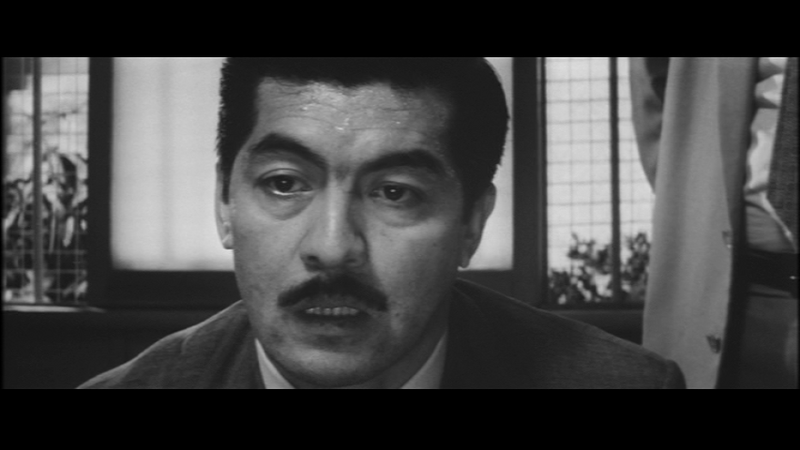 This is a three hour long movie -- yet it is rarely boring. This is due to both superb performances and absolutely stunning black and white Toeiscope cinemaphotography, deliberately given a gritty look by being shot with 16mm film, which was then blown up to 35mm for projection. No English subbed version available for home consumption, just a French-subbed version -- and the Japanese DVD I watched. Some images:
This is a three hour long movie -- yet it is rarely boring. This is due to both superb performances and absolutely stunning black and white Toeiscope cinemaphotography, deliberately given a gritty look by being shot with 16mm film, which was then blown up to 35mm for projection. No English subbed version available for home consumption, just a French-subbed version -- and the Japanese DVD I watched. Some images:
http://i9.photobucket.com/albums/a59/mkerpan/kiga_kaikyo/kiga01.png
http://i9.photobucket.com/albums/a59/mkerpan/kiga_kaikyo/kiga04.png
http://i9.photobucket.com/albums/a59/mkerpan/kiga_kaikyo/kiga05.png
http://i9.photobucket.com/albums/a59/mkerpan/kiga_kaikyo/kiga06.png
http://i9.photobucket.com/albums/a59/mkerpan/kiga_kaikyo/kiga13.png
http://i9.photobucket.com/albums/a59/mkerpan/kiga_kaikyo/kiga17.png
http://i9.photobucket.com/albums/a59/mkerpan/kiga_kaikyo/kiga18.png
http://i9.photobucket.com/albums/a59/mkerpan/kiga_kaikyo/kiga19.png
Sam sei goon /Justice, My Foot! (Johnnie To, 1992)
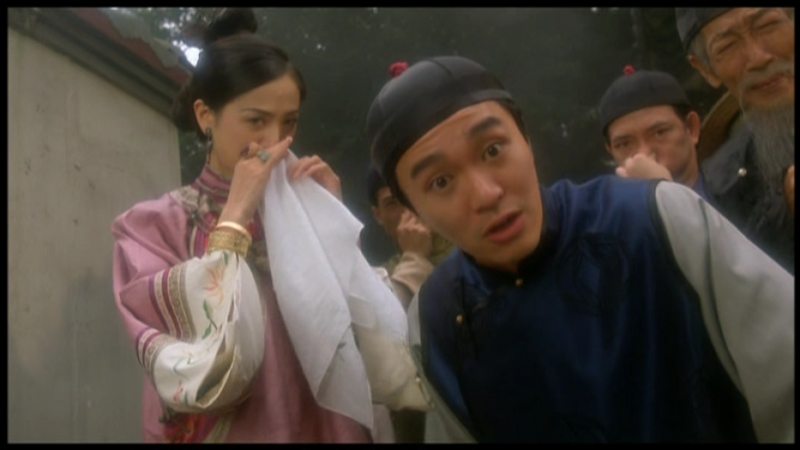 Stephen Chow as a slick shyster lawyer in ancient China, who always fights for whoever pays best -- which proves disastrous on the domestic level (due to a curse placed on him). His wife (the wonderful Anita Mui) insists he retire, which he does with great reluctance.
Stephen Chow as a slick shyster lawyer in ancient China, who always fights for whoever pays best -- which proves disastrous on the domestic level (due to a curse placed on him). His wife (the wonderful Anita Mui) insists he retire, which he does with great reluctance.  After a while, Mui (now massively pregnant) gets him embroiled in rescuing a new mother in distress (wrongly accused of killing her husband -- by wicked relatives of the husband, who actually did the evil deed). Chaos ensues but (eventually) justice prevails. Part of the fun here is that Chow is a thoroughgoing wimp -- while Mui is a rather formidable fighter.
After a while, Mui (now massively pregnant) gets him embroiled in rescuing a new mother in distress (wrongly accused of killing her husband -- by wicked relatives of the husband, who actually did the evil deed). Chaos ensues but (eventually) justice prevails. Part of the fun here is that Chow is a thoroughgoing wimp -- while Mui is a rather formidable fighter.
http://i9.photobucket.com/albums/a59/mkerpan/justice/myfoot01.png
http://i9.photobucket.com/albums/a59/mkerpan/justice/myfoot05.png
http://i9.photobucket.com/albums/a59/mkerpan/justice/myfoot07.png
http://i9.photobucket.com/albums/a59/mkerpan/justice/myfoot09.png
http://i9.photobucket.com/albums/a59/mkerpan/justice/myfoot10.png
http://i9.photobucket.com/albums/a59/mkerpan/justice/myfoot11.png
Bushi no ichibun / Love and Honor (Yoji Yamada, 2006)
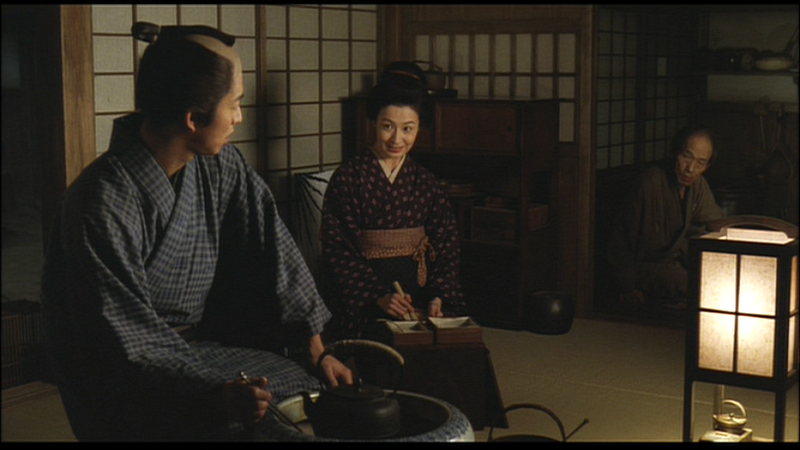 After a long career of making dramas about modern day life, Yoji Yamada first tackled his study of life at the low end of the samurai world (shortly before that world collapsed) with "Twilight Samurai" in 2002. His newest film is the third and last of this phase of Yamada's work (his next film will portray wartime Japan).
After a long career of making dramas about modern day life, Yoji Yamada first tackled his study of life at the low end of the samurai world (shortly before that world collapsed) with "Twilight Samurai" in 2002. His newest film is the third and last of this phase of Yamada's work (his next film will portray wartime Japan).
 The hero here is played by Takuya Mimura (superstar member of the group "SNAP" -- and voice of Miyazaki's Howl), who portrays one of his clan lord's food tasters. He goes blind near the outset of the film, due to the unwise choice of a certain out-of-season sea delicacy by the lord's chamberlain. Ironically, he had been dreaming of quitting his post to start a small training school, a plan approved by his wife (Rei Dan), despite the impact this would have on their standard of living.
The hero here is played by Takuya Mimura (superstar member of the group "SNAP" -- and voice of Miyazaki's Howl), who portrays one of his clan lord's food tasters. He goes blind near the outset of the film, due to the unwise choice of a certain out-of-season sea delicacy by the lord's chamberlain. Ironically, he had been dreaming of quitting his post to start a small training school, a plan approved by his wife (Rei Dan), despite the impact this would have on their standard of living. 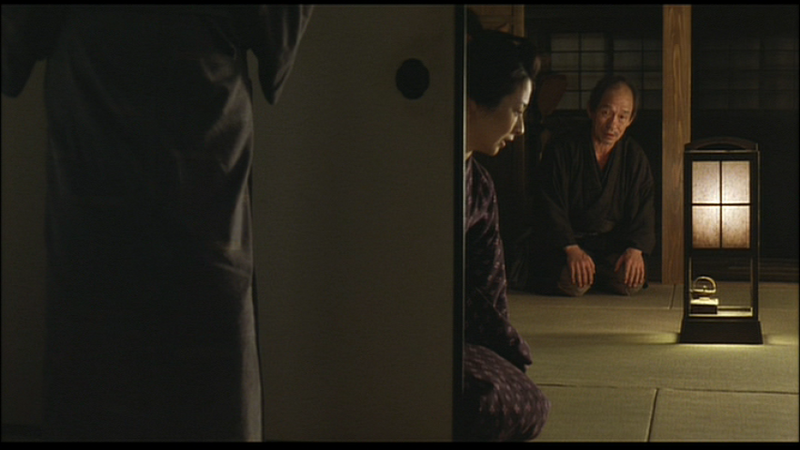 A high level official, who the wife knew in her youth, suggests that he might be able to get some help for her now unemployable husband. While the wife is reluctant, her husband's relatives approve seeking help from this source -- as it means they needn't worry about supporting the couple. As the wife feared, the promised aid has a high price. and marital discord -- and a seemingly hopeless plan for revenge -- follows in the wake.
A high level official, who the wife knew in her youth, suggests that he might be able to get some help for her now unemployable husband. While the wife is reluctant, her husband's relatives approve seeking help from this source -- as it means they needn't worry about supporting the couple. As the wife feared, the promised aid has a high price. and marital discord -- and a seemingly hopeless plan for revenge -- follows in the wake.
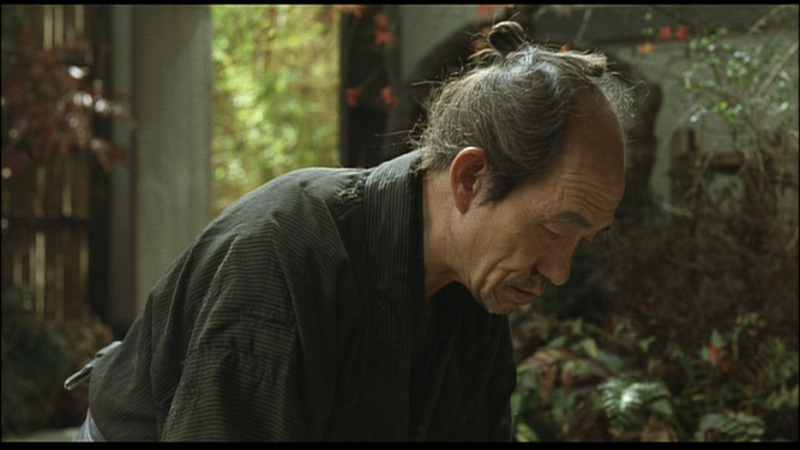 The performances here are first-rate -- and the most acclaimed of all was that of the couple's trusty old servant, played by Takashi Sasano. Rei Dan, a newcomer to cinema, also picked up numerous awards and nominations. Wonderful cinematography, a fine story, lovely music. Too bad it's not an art film....
The performances here are first-rate -- and the most acclaimed of all was that of the couple's trusty old servant, played by Takashi Sasano. Rei Dan, a newcomer to cinema, also picked up numerous awards and nominations. Wonderful cinematography, a fine story, lovely music. Too bad it's not an art film....
http://i9.photobucket.com/albums/a59/mkerpan/ichibun/bushi02.png
http://i9.photobucket.com/albums/a59/mkerpan/ichibun/bushi03.png
http://i9.photobucket.com/albums/a59/mkerpan/ichibun/bushi06.png
http://i9.photobucket.com/albums/a59/mkerpan/ichibun/bushi13.png
http://i9.photobucket.com/albums/a59/mkerpan/ichibun/bushi14.png
Kencho no hoshi / Star Reformer / Star of the Prefectural Government (Hiroshi Nishitani, 2006)
 From time to time, I like to check out current Japanese films that are popular at home but have essentially zero chance of Western distribution. this satire of local-level bureaucracy and business (mixed with romance) was well-reviewed -- but strikes me as no better than average "television quality" in terms of script (sloppy and improbable) and cinematography (mostly uninspired). While our earnest bureaucrat protagonist (sent to serve as apprentice in a rather dumpy super-market -- in order to tap the opinions of "common people") is played well enough by Yuji Oda, the only stand-out feature of the film for me is his mentor at the supermarket -- played by lovely Kou Shibasaki. She handles her rather undemanding role quite nicely.
From time to time, I like to check out current Japanese films that are popular at home but have essentially zero chance of Western distribution. this satire of local-level bureaucracy and business (mixed with romance) was well-reviewed -- but strikes me as no better than average "television quality" in terms of script (sloppy and improbable) and cinematography (mostly uninspired). While our earnest bureaucrat protagonist (sent to serve as apprentice in a rather dumpy super-market -- in order to tap the opinions of "common people") is played well enough by Yuji Oda, the only stand-out feature of the film for me is his mentor at the supermarket -- played by lovely Kou Shibasaki. She handles her rather undemanding role quite nicely.
http://i9.photobucket.com/albums/a59/mkerpan/star/reformer05.png
http://i9.photobucket.com/albums/a59/mkerpan/star/reformer01.png
http://i9.photobucket.com/albums/a59/mkerpan/star/reformer02.png
http://i9.photobucket.com/albums/a59/mkerpan/star/reformer03.png
(It took real work to find a few moderately interesting screen shots for this film -- as opposed to the Uchida film -- where limiting oneself to just a few shots was almost painful).
 A high-minded, romance between a young doctor and a wealthy young woman (an actress playing Ophelia when seen first), set against the backdrop of the rise of totalitarianism, the war, and the immediate aftermath of the war. The script strikes me as a bit arbitrary -- and we never quite figure out why the poor little rich girl (Mieko Takamine) falls in love with the virtuous plebeian (and a bit stolid) doctor (Ichiro Ryuzaki). Still even a subpar video transfer of this film doesn't entirely mask the fact that this is a very good-looking, well-presented film.
A high-minded, romance between a young doctor and a wealthy young woman (an actress playing Ophelia when seen first), set against the backdrop of the rise of totalitarianism, the war, and the immediate aftermath of the war. The script strikes me as a bit arbitrary -- and we never quite figure out why the poor little rich girl (Mieko Takamine) falls in love with the virtuous plebeian (and a bit stolid) doctor (Ichiro Ryuzaki). Still even a subpar video transfer of this film doesn't entirely mask the fact that this is a very good-looking, well-presented film.http://i9.photobucket.com/albums/a59/mkerpan/once_again/ima05.png
http://i9.photobucket.com/albums/a59/mkerpan/once_again/ima02.png
http://i9.photobucket.com/albums/a59/mkerpan/once_again/ima06.png
Himeyuri no tô / Tower of Lilies (Tadashi Imai, 1953)
 The Himeyuri Gakuto (Star Lily Corps) was a group of around 200 high school girls (ranging from 15 to 19 years old) who were called into service as nurse's aides just three days before the Allies began the invasion of Okinawa (a battle which would last around three months). As the Japanese military position worsened, the hospital corps was dissolved, and the girls and their teachers were left to try to find their own way home. Only 80 or so of the girls survived, most died due to privation (it rained constantly for a month or so as they tried to cross the island on foot), Allied attacks and suicide (terrified of what would happen if they fell into the hands of the invaders).
The Himeyuri Gakuto (Star Lily Corps) was a group of around 200 high school girls (ranging from 15 to 19 years old) who were called into service as nurse's aides just three days before the Allies began the invasion of Okinawa (a battle which would last around three months). As the Japanese military position worsened, the hospital corps was dissolved, and the girls and their teachers were left to try to find their own way home. Only 80 or so of the girls survived, most died due to privation (it rained constantly for a month or so as they tried to cross the island on foot), Allied attacks and suicide (terrified of what would happen if they fell into the hands of the invaders). The film, though fictionalized to some extent, seems to follow the historical facts reasonably closely (American authorities forbade filming this on Okinawa -- so this was actually shot in southern Japan). Insofar as there is a central character, it is the young student played by Kyoko Kagawa. Teachers included Susumu Fujita, Eiji Okada and Keiko Tsushima. All the huge cast of girls does well, however.
The film, though fictionalized to some extent, seems to follow the historical facts reasonably closely (American authorities forbade filming this on Okinawa -- so this was actually shot in southern Japan). Insofar as there is a central character, it is the young student played by Kyoko Kagawa. Teachers included Susumu Fujita, Eiji Okada and Keiko Tsushima. All the huge cast of girls does well, however. One guesses that, when the weather clears, allowing the girls a brief moment of pleasure, disaster looms -- and it does. A lot of similarities here to Ichikawa's war films -- and Takahata's "Grave of the Fireflies". As usual for Imai, well-directed and expertly shot (by his regular cinematographer Shunichiro Nakao).
One guesses that, when the weather clears, allowing the girls a brief moment of pleasure, disaster looms -- and it does. A lot of similarities here to Ichikawa's war films -- and Takahata's "Grave of the Fireflies". As usual for Imai, well-directed and expertly shot (by his regular cinematographer Shunichiro Nakao).http://i9.photobucket.com/albums/a59/mkerpan/himeyuri/himeyuri03.png
http://i9.photobucket.com/albums/a59/mkerpan/himeyuri/himeyuri04.png
http://i9.photobucket.com/albums/a59/mkerpan/himeyuri/himeyuri05.png
http://i9.photobucket.com/albums/a59/mkerpan/himeyuri/himeyuri06.png
http://i9.photobucket.com/albums/a59/mkerpan/himeyuri/himeyuri12.png
http://i9.photobucket.com/albums/a59/mkerpan/himeyuri/himeyuri15.png
http://i9.photobucket.com/albums/a59/mkerpan/himeyuri/himeyuri18.png
Kiga kaikyo / Strait of Hunger / Fugitive from the Past (Tomu Uchida, 1965)
 Rentaro Mikumi stars here as Inukai, one of a trio who pulls off a robbery during the height of a deadly typhoon (a real one, that took place in 1947). As the storm subsides, he makes his getaway across the strait that separates Honshu and Hokkaido -- leaving us to wonder what happened to his accomplices.
Rentaro Mikumi stars here as Inukai, one of a trio who pulls off a robbery during the height of a deadly typhoon (a real one, that took place in 1947). As the storm subsides, he makes his getaway across the strait that separates Honshu and Hokkaido -- leaving us to wonder what happened to his accomplices.  Inukai is rescued, in a manner of speaking, by Yae a good-natured, but somewhat scatty young woman (Sachiko Hidari), whose father runs a small hot springs resort. As a parting gift, Inukai leaves far too large a tip, making Yae positively worshipful. With her windfall, Yae plans to go to Tokyo to seek her fortune.
Inukai is rescued, in a manner of speaking, by Yae a good-natured, but somewhat scatty young woman (Sachiko Hidari), whose father runs a small hot springs resort. As a parting gift, Inukai leaves far too large a tip, making Yae positively worshipful. With her windfall, Yae plans to go to Tokyo to seek her fortune.  As she is planning her departure, a police lieutenant (Junzaburo Ban) visits the spa, seeking Inukai -- who is apparently wanted in connection with the death of two men. Yae does move -- but finds Tokyo not so nice as she imagined, finding a job only as a waitress in a seedy restaurant in a very crime-ridden part of the city. Her luck turns when she convinces a kindly couple who runs a small brothel to hire her as an apprentice.
As she is planning her departure, a police lieutenant (Junzaburo Ban) visits the spa, seeking Inukai -- who is apparently wanted in connection with the death of two men. Yae does move -- but finds Tokyo not so nice as she imagined, finding a job only as a waitress in a seedy restaurant in a very crime-ridden part of the city. Her luck turns when she convinces a kindly couple who runs a small brothel to hire her as an apprentice.  We then skip ten years -- to find Yae relatively contented as a sort of faux geisha/prostitute. All goes well with her, until she sees a newspaper article about a local benefactor -- who she is convinced must be her beloved Inukai (although the photograph identifies him as a Mr. Tarumi) . She sets off across Tokyo for a reunion -- but Tarumi staunchly denies knowing what she is talking about.... More misfortune ultimately ensues, and a young Tokyo detective (Ken Takakura) is assigned to work on the case.
We then skip ten years -- to find Yae relatively contented as a sort of faux geisha/prostitute. All goes well with her, until she sees a newspaper article about a local benefactor -- who she is convinced must be her beloved Inukai (although the photograph identifies him as a Mr. Tarumi) . She sets off across Tokyo for a reunion -- but Tarumi staunchly denies knowing what she is talking about.... More misfortune ultimately ensues, and a young Tokyo detective (Ken Takakura) is assigned to work on the case. This is a three hour long movie -- yet it is rarely boring. This is due to both superb performances and absolutely stunning black and white Toeiscope cinemaphotography, deliberately given a gritty look by being shot with 16mm film, which was then blown up to 35mm for projection. No English subbed version available for home consumption, just a French-subbed version -- and the Japanese DVD I watched. Some images:
This is a three hour long movie -- yet it is rarely boring. This is due to both superb performances and absolutely stunning black and white Toeiscope cinemaphotography, deliberately given a gritty look by being shot with 16mm film, which was then blown up to 35mm for projection. No English subbed version available for home consumption, just a French-subbed version -- and the Japanese DVD I watched. Some images:http://i9.photobucket.com/albums/a59/mkerpan/kiga_kaikyo/kiga01.png
http://i9.photobucket.com/albums/a59/mkerpan/kiga_kaikyo/kiga04.png
http://i9.photobucket.com/albums/a59/mkerpan/kiga_kaikyo/kiga05.png
http://i9.photobucket.com/albums/a59/mkerpan/kiga_kaikyo/kiga06.png
http://i9.photobucket.com/albums/a59/mkerpan/kiga_kaikyo/kiga13.png
http://i9.photobucket.com/albums/a59/mkerpan/kiga_kaikyo/kiga17.png
http://i9.photobucket.com/albums/a59/mkerpan/kiga_kaikyo/kiga18.png
http://i9.photobucket.com/albums/a59/mkerpan/kiga_kaikyo/kiga19.png
Sam sei goon /Justice, My Foot! (Johnnie To, 1992)
 Stephen Chow as a slick shyster lawyer in ancient China, who always fights for whoever pays best -- which proves disastrous on the domestic level (due to a curse placed on him). His wife (the wonderful Anita Mui) insists he retire, which he does with great reluctance.
Stephen Chow as a slick shyster lawyer in ancient China, who always fights for whoever pays best -- which proves disastrous on the domestic level (due to a curse placed on him). His wife (the wonderful Anita Mui) insists he retire, which he does with great reluctance.  After a while, Mui (now massively pregnant) gets him embroiled in rescuing a new mother in distress (wrongly accused of killing her husband -- by wicked relatives of the husband, who actually did the evil deed). Chaos ensues but (eventually) justice prevails. Part of the fun here is that Chow is a thoroughgoing wimp -- while Mui is a rather formidable fighter.
After a while, Mui (now massively pregnant) gets him embroiled in rescuing a new mother in distress (wrongly accused of killing her husband -- by wicked relatives of the husband, who actually did the evil deed). Chaos ensues but (eventually) justice prevails. Part of the fun here is that Chow is a thoroughgoing wimp -- while Mui is a rather formidable fighter.http://i9.photobucket.com/albums/a59/mkerpan/justice/myfoot01.png
http://i9.photobucket.com/albums/a59/mkerpan/justice/myfoot05.png
http://i9.photobucket.com/albums/a59/mkerpan/justice/myfoot07.png
http://i9.photobucket.com/albums/a59/mkerpan/justice/myfoot09.png
http://i9.photobucket.com/albums/a59/mkerpan/justice/myfoot10.png
http://i9.photobucket.com/albums/a59/mkerpan/justice/myfoot11.png
Bushi no ichibun / Love and Honor (Yoji Yamada, 2006)
 After a long career of making dramas about modern day life, Yoji Yamada first tackled his study of life at the low end of the samurai world (shortly before that world collapsed) with "Twilight Samurai" in 2002. His newest film is the third and last of this phase of Yamada's work (his next film will portray wartime Japan).
After a long career of making dramas about modern day life, Yoji Yamada first tackled his study of life at the low end of the samurai world (shortly before that world collapsed) with "Twilight Samurai" in 2002. His newest film is the third and last of this phase of Yamada's work (his next film will portray wartime Japan). The hero here is played by Takuya Mimura (superstar member of the group "SNAP" -- and voice of Miyazaki's Howl), who portrays one of his clan lord's food tasters. He goes blind near the outset of the film, due to the unwise choice of a certain out-of-season sea delicacy by the lord's chamberlain. Ironically, he had been dreaming of quitting his post to start a small training school, a plan approved by his wife (Rei Dan), despite the impact this would have on their standard of living.
The hero here is played by Takuya Mimura (superstar member of the group "SNAP" -- and voice of Miyazaki's Howl), who portrays one of his clan lord's food tasters. He goes blind near the outset of the film, due to the unwise choice of a certain out-of-season sea delicacy by the lord's chamberlain. Ironically, he had been dreaming of quitting his post to start a small training school, a plan approved by his wife (Rei Dan), despite the impact this would have on their standard of living.  A high level official, who the wife knew in her youth, suggests that he might be able to get some help for her now unemployable husband. While the wife is reluctant, her husband's relatives approve seeking help from this source -- as it means they needn't worry about supporting the couple. As the wife feared, the promised aid has a high price. and marital discord -- and a seemingly hopeless plan for revenge -- follows in the wake.
A high level official, who the wife knew in her youth, suggests that he might be able to get some help for her now unemployable husband. While the wife is reluctant, her husband's relatives approve seeking help from this source -- as it means they needn't worry about supporting the couple. As the wife feared, the promised aid has a high price. and marital discord -- and a seemingly hopeless plan for revenge -- follows in the wake. The performances here are first-rate -- and the most acclaimed of all was that of the couple's trusty old servant, played by Takashi Sasano. Rei Dan, a newcomer to cinema, also picked up numerous awards and nominations. Wonderful cinematography, a fine story, lovely music. Too bad it's not an art film....
The performances here are first-rate -- and the most acclaimed of all was that of the couple's trusty old servant, played by Takashi Sasano. Rei Dan, a newcomer to cinema, also picked up numerous awards and nominations. Wonderful cinematography, a fine story, lovely music. Too bad it's not an art film....http://i9.photobucket.com/albums/a59/mkerpan/ichibun/bushi02.png
http://i9.photobucket.com/albums/a59/mkerpan/ichibun/bushi03.png
http://i9.photobucket.com/albums/a59/mkerpan/ichibun/bushi06.png
http://i9.photobucket.com/albums/a59/mkerpan/ichibun/bushi13.png
http://i9.photobucket.com/albums/a59/mkerpan/ichibun/bushi14.png
Kencho no hoshi / Star Reformer / Star of the Prefectural Government (Hiroshi Nishitani, 2006)
 From time to time, I like to check out current Japanese films that are popular at home but have essentially zero chance of Western distribution. this satire of local-level bureaucracy and business (mixed with romance) was well-reviewed -- but strikes me as no better than average "television quality" in terms of script (sloppy and improbable) and cinematography (mostly uninspired). While our earnest bureaucrat protagonist (sent to serve as apprentice in a rather dumpy super-market -- in order to tap the opinions of "common people") is played well enough by Yuji Oda, the only stand-out feature of the film for me is his mentor at the supermarket -- played by lovely Kou Shibasaki. She handles her rather undemanding role quite nicely.
From time to time, I like to check out current Japanese films that are popular at home but have essentially zero chance of Western distribution. this satire of local-level bureaucracy and business (mixed with romance) was well-reviewed -- but strikes me as no better than average "television quality" in terms of script (sloppy and improbable) and cinematography (mostly uninspired). While our earnest bureaucrat protagonist (sent to serve as apprentice in a rather dumpy super-market -- in order to tap the opinions of "common people") is played well enough by Yuji Oda, the only stand-out feature of the film for me is his mentor at the supermarket -- played by lovely Kou Shibasaki. She handles her rather undemanding role quite nicely.http://i9.photobucket.com/albums/a59/mkerpan/star/reformer05.png
http://i9.photobucket.com/albums/a59/mkerpan/star/reformer01.png
http://i9.photobucket.com/albums/a59/mkerpan/star/reformer02.png
http://i9.photobucket.com/albums/a59/mkerpan/star/reformer03.png
(It took real work to find a few moderately interesting screen shots for this film -- as opposed to the Uchida film -- where limiting oneself to just a few shots was almost painful).
Comments
Even my wife found this fairly easy to follow despite the lack of subtitles (and she doesn't even pretend to understand Japanese dialog).
Did you get to see "bloody Spear at Mt. Fuji"?